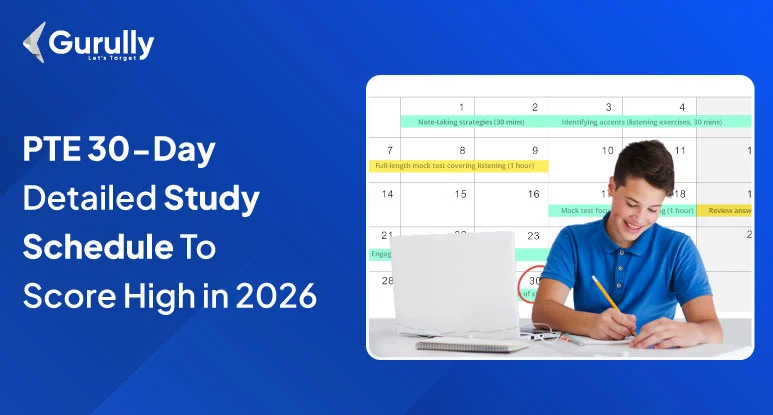Preparing for the PTE exam requires a strategic approach to cover all sections comprehensively. The PTE 30-Day Matrix method provides a well-rounded preparation plan focusing on listening, reading, speaking, and writing skills over four weeks, followed by an integrated Pearson PTE practice week. Here’s a detailed breakdown of the PTE Study Plan For 30 Days to help you maximize your preparation and achieve your desired score.
PTE Study Plan For 30 Days
Week 1: Focus On Listening
Day 1:
- Note-taking strategies (30 min): Learn effective techniques for jotting down key points while listening.
- Practice summarizing spoken text (5 questions, 30 mins): Listen to short audio clips and practice summarizing the main ideas.
- Vocabulary review from listening (30 mins): Review and expand vocabulary based on the listening exercises.
Day 2:
- Summarizing audio clips (5 questions, 30 mins): Continue practicing summarizing skills with a new set of audio clips.
- Practice fill-in-the-blank listening (10 questions, 30 mins): Enhance your ability to predict missing words based on context.
- Listening to podcasts and noting key points (30 mins): Listen to English podcasts to improve comprehension and note-taking skills.
Day 3:
- Identifying accents (listening exercises, 30 mins): Familiarize yourself with different English accents and improve listening accuracy.
- Highlighting correct words (10 questions, 30 mins): Practice identifying correct words in sentences after listening to them.
- Review vocabulary from previous days (30 mins): Reinforce vocabulary learned over the past days to ensure retention.
Day 4:
- Practice with PTE listening tasks (5 tasks, 1 hour): Engage in various PTE-specific listening tasks to build familiarity and confidence.
- Write from dictation (30 questions, 1 hour): Improve your listening and writing skills by transcribing spoken sentences accurately.
Day 5 & 6 :
- Integrated practice (listening and speaking tasks, 1 hour): Combine listening with speaking tasks to enhance multitasking abilities.
- Mock test focusing on listening (1 hour): Take a PTE practice test to assess your listening skills and identify areas for improvement.
- Vocabulary building (30 mins): Focus on expanding vocabulary relevant to the listening section.
- Practice summarizing spoken text (5 questions, 30 mins): Revisit summarizing tasks to reinforce skills.
Day 7:
- Full-length mock test covering listening (1 hour): Simulate test conditions with a full-length listening test.
- Review answers and identify mistakes (1 hour): Carefully analyze your mistakes to understand where you went wrong and how to improve.
In PTE study plan for 30 days, start with the listening section. As once you are able to increase your proficiency in listening, you will be able to crack down other sections easily.
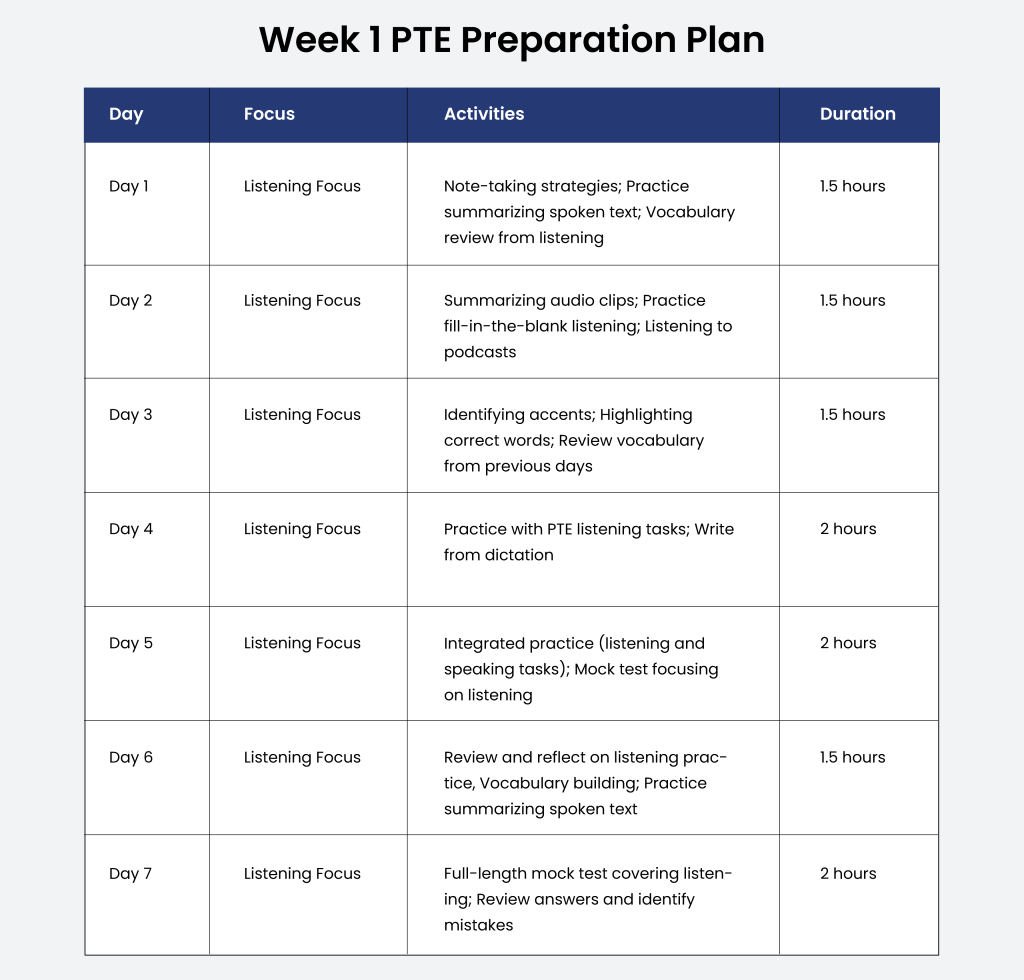
You can also refer to our Youtube Video on Get PTE Score 79+ in 15 Days!!
Week 2: Focus On Reading Section
Day 8:
- Skimming and scanning techniques (30 min): Learn efficient reading techniques to locate information in texts quickly.
- Practice reading fill-in-the-blanks (10 questions, 30 min): Enhance comprehension and grammar skills with fill-in-the-blank exercises.
- Vocabulary review (30 min): Continue expanding vocabulary, focusing on words that commonly appear in reading passages.
Day 9:
- Identifying main ideas in passages (5 questions, 30 min): Practice finding the central ideas in different types of passages.
- Practice reordering paragraphs (10 questions, 30 min): Develop skills to reorder shuffled paragraphs logically.
- Review vocabulary (30 min): Reinforce vocabulary relevant to reading comprehension.
Start your free PTE mock test with Gurully and get AI-powered analysis for a personalized journey.

- Kickstart your PTE prep with a free AI-scored mock test
- Boost your score with in-depth analysis & smart recommendations
Day 10:
- Understand context in reading (5 passages, 1 hour): Practice understanding the context and implications in various passages.
- Practice with PTE reading tasks (1 hour): Engage in a variety of reading tasks specific to the PTE exam format.
Day 11:
- Integrated practice (reading and writing tasks, 1 hour): Combine reading and writing tasks to simulate the integrated nature of the PTE exam.
- Mock test focusing on reading (1 hour): Take a focused reading test to gauge your abilities and identify weaknesses.
Day 12:
- Review and reflect on reading practice (30 min): Assess your reading performance and strategize for improvement.
- Vocabulary building (30 min): Continue to enhance your vocabulary, focusing on high-frequency words in reading sections.
- Practice reading fill-in-the-blanks (10 questions, 30 min): Further practice on fill-in-the-blank questions to improve grammar and comprehension.
Day 13:
- Full-length mock test covering reading (1 hour): Take a comprehensive reading test to apply strategies learned.
- Review answers and identify mistakes (1 hour): Analyze incorrect answers to understand mistakes and refine strategies.
Day 14:
- Summarize key learning points from reading practice (30 min): Consolidate what you’ve learned from reading exercises.
- Engage in vocabulary exercises (30 min): Engage in targeted vocabulary exercises to boost retention.
- Review reading strategies (30 min): Review effective reading strategies to ensure you are prepared for different question types.
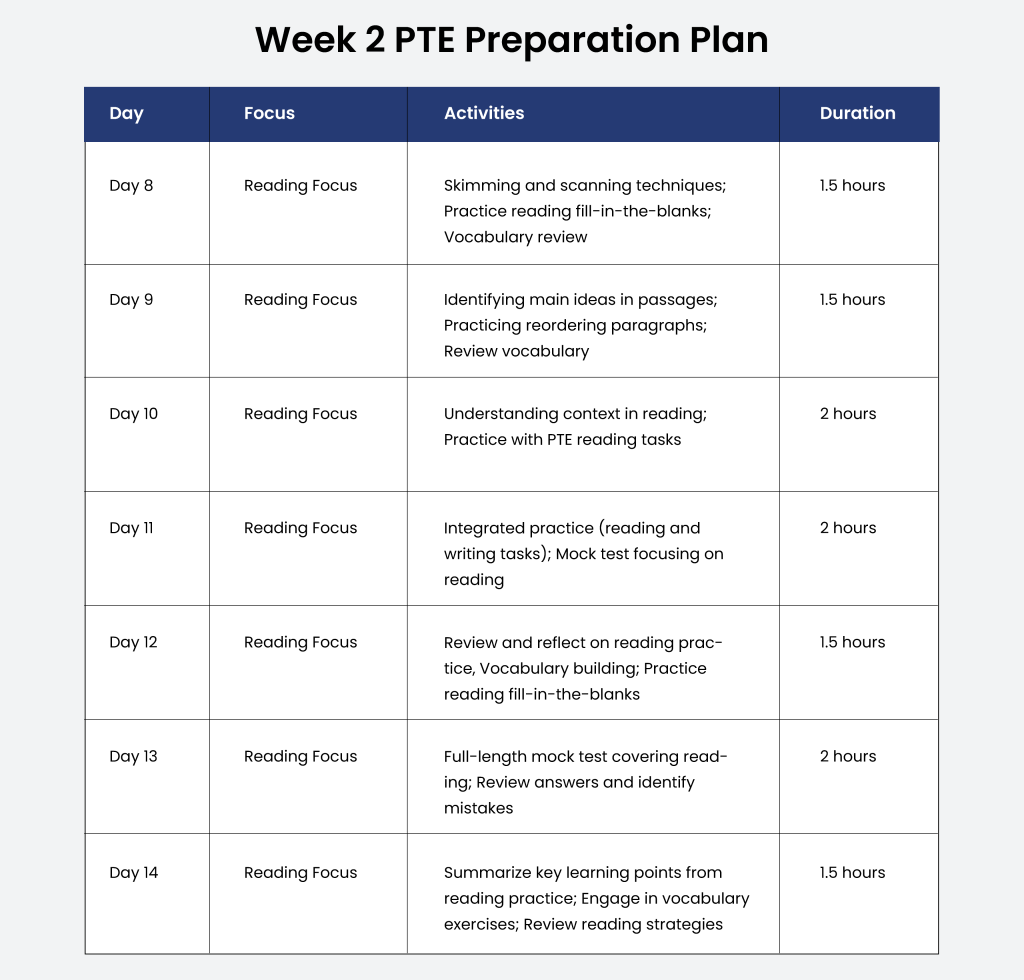
Week 3: Focus On the Speaking Section
Day 15:
- Pronunciation practice (30 min): Work on improving pronunciation through targeted exercises.
- Fluency drills (30 min): Practice speaking fluently without hesitation to improve speaking scores.
- Practice speaking tasks (Describe Image) (5 tasks, 30 min): Focus on describing images effectively within the given time frame.
Day 16:
- Response structuring for speaking tasks (30 min): Learn to structure your responses clearly and coherently.
- Practice retail lecture (3 tasks, 30 min): Practice summarizing spoken content in a structured manner.
- Review vocabulary related to speaking (30 min): Review and learn vocabulary that is useful for speaking tasks.
Day 17:
- Integrated practice (speaking and listening tasks, 1 hour): Combine speaking and listening tasks to enhance overall fluency and comprehension.
- Mock test focusing on speaking (1 hour): Take a mock test focusing solely on speaking to assess your progress.

Get instant AI-powered analysis to track strengths, weaknesses & improve
- Personalized AI Insights – Understand your strengths & weaknesses instantly
- Smart Progress Tracking – Monitor improvement with in-depth analysis
- Boost Your Score Faster – Focus only where it matters most
Day 18:
- Review and reflect on speaking practice (30 min): Analyze speaking performances to identify strengths and weaknesses.
- Vocabulary building (30 min): Enhance vocabulary pertinent to speaking tasks to improve expression.
- Practice speaking tasks (Repeat Sentence) (10 tasks, 30 min): Work on repeating sentences accurately to improve short-term memory and pronunciation.
Day 19:
- Full-length mock test covering speaking (1 hour): Simulate the speaking portion of the PTE exam to test your skills under timed conditions.
- Review answers and identify mistakes (1 hour): Review your recorded responses to identify areas for improvement.
Day 20:
- Engage in peer practice sessions (1 hour): Practice speaking with peers to gain confidence and receive constructive feedback.
- Record and review speaking tasks (1 hour): Record your speaking tasks and listen to them to self-assess pronunciation, fluency, and coherence.
Day 21:
- Summarize key learning points from speaking practice (30 min): Reflect on key takeaways and areas for further improvement.
- Engage in vocabulary exercises (30 min): Continue to build vocabulary specifically for speaking tasks.
- Review speaking strategies (30 min): Review and refine strategies for different speaking task types.
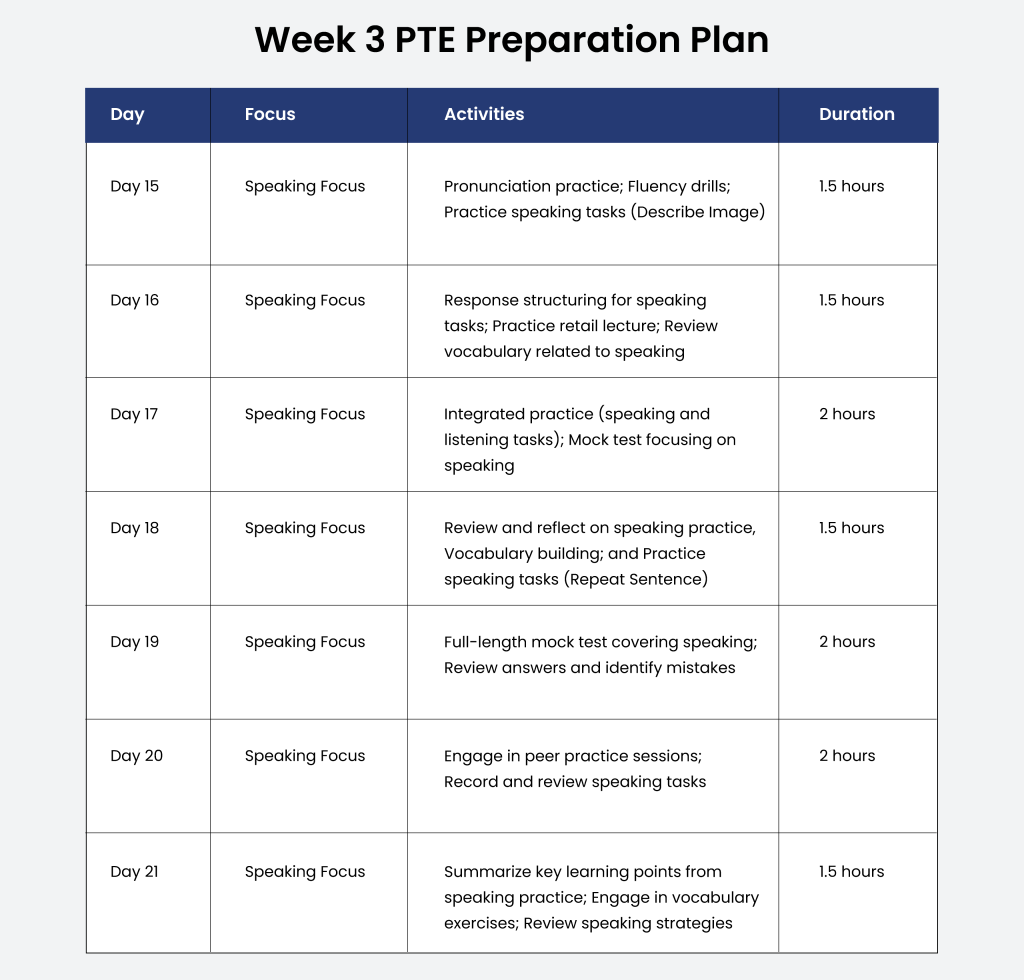
Week 4: Focus on the Writing Section
Day 22:
- Essay structure and planning (30 min): Learn effective essay planning and structuring techniques to enhance writing coherence.
- Practice writing tasks (2 essays, 1 hour): Write essays to improve articulation and coherence.
- Review grammar rules (30 min): Review essential grammar rules to minimize errors in writing.
Day 23:
- Argument development in writing (30 min): Focus on developing strong arguments and supporting them with evidence.
- Practice summarizing written text (5 tasks, 30 min): Improve your ability to summarize written content concisely.
- Vocabulary review (30 min): Review and expand vocabulary that is particularly useful for writing tasks.
Day 24:
- Integrated practice (writing and reading tasks, 1 hour): Practice tasks that integrate writing and reading skills.
- Mock test focusing on writing (1 hour): Take a mock test to simulate the writing section of the PTE exam.
Day 25:
- Review and reflect on writing practice (30 min): Evaluate your writing to identify patterns in mistakes and areas for improvement.
- Vocabulary building (30 min): Focus on vocabulary that enhances written expression.
- Practice writing tasks (1 essay, 30 min): Continue practicing essay writing to build endurance and skill.
Day 26:
- Full-length mock test covering writing (1 hour): Take a full-length writing test under timed conditions.
- Review answers and identify mistakes (1 hour): Carefully review your writing to identify errors and refine strategies.
Day 27:
- Engage in peer review sessions (1 hour): Participate in peer reviews to gain new insights and constructive feedback on your writing.
- Record and review writing tasks (1 hour): Record your writing tasks to reflect on your writing process and outcomes.
Day 28,29,30:
Summarize key learning points from writing practice (30 min): Reflect on the main lessons learned from writing practice.
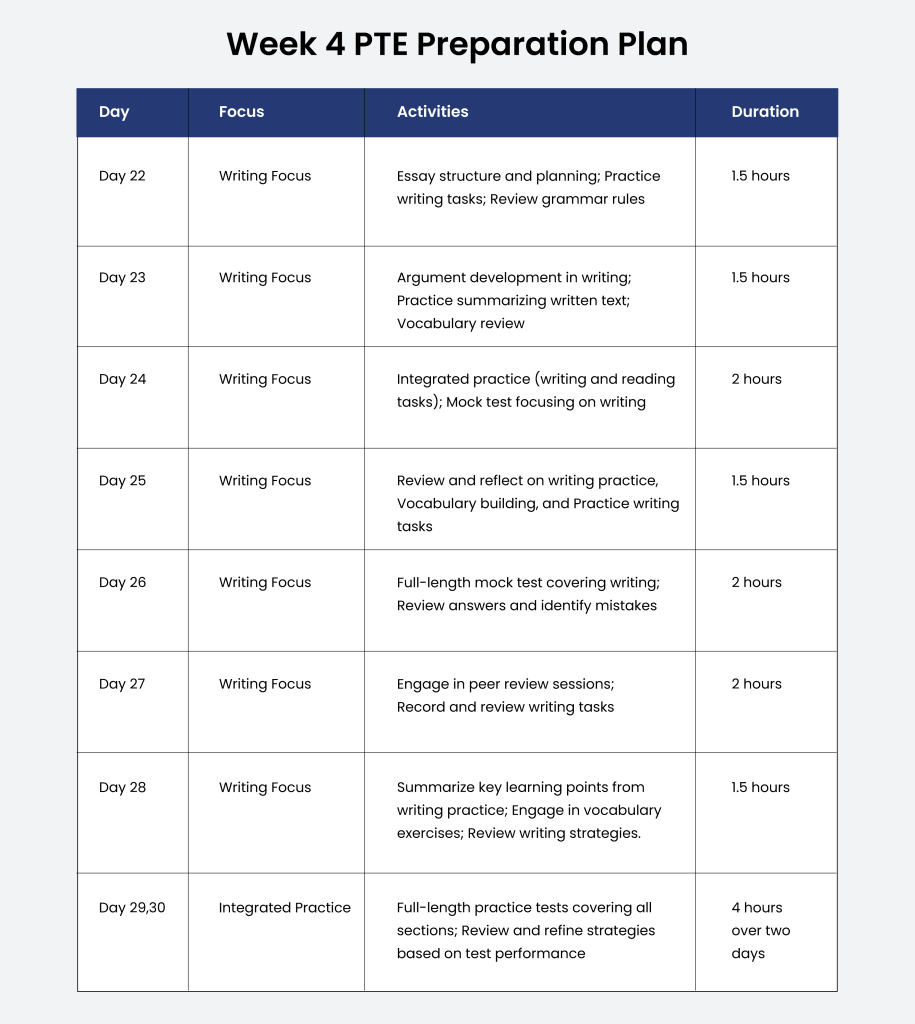
A 30 days PTE study plan must include practicing on a full-length mock test. You can use Gurully’s online practice platform to prepare for the PTE exam. We provide AI-powered mock tests that mimic the actual test environment. To strengthen different sections of PTE, you can take section-wise mock tests. Along with that, Gurully offers a knowledge zone, prediction files, and a PTE practice app for mobile.
Conclusion:
The PTE Study Plan For 30 Days provides a comprehensive plan for PTE preparation, focusing on all four skills. By following this plan, you can effectively improve your listening, reading, speaking, and writing abilities. Regular practice, vocabulary building, and feedback are essential for success. Remember to simulate real-time exam conditions with mock tests and focus on areas where you need improvement. Consistent effort and dedication will help you achieve your desired PTE score.
FAQ
Is 1 month enough for PTE?
How to score 79+ in PTE?
Is PTE 74 a good score?
Is 50 in PTE equivalent to 6 in IELTS?
What happens if I fail PTE?
Also Read:
- Score High in PTE Pie Chart – Template, Tips and Sample Questions with Answers
- Gurully’s PTE Study Material – Guide for Your Exam Success
- Practice With 70+ Most Repeated PTE Write from Dictation Questions
- PTE Map Chart – Tips, Template, & Sample Questions With Answers
Free PTE Practice Tests


